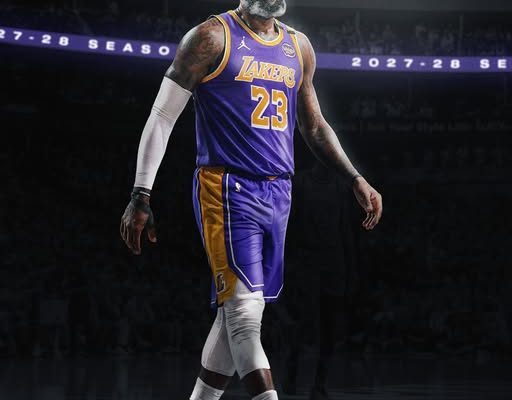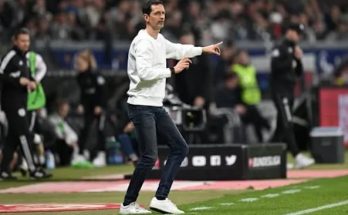LeBron James has always defied time, expectations, and logic. From the moment he entered the NBA in 2003 as an 18-year-old phenom out of St. Vincent-St. Mary High School, the basketball world has been on a ride that refuses to slow down. Now, over two decades later, the four-time NBA champion and league icon is once again making headlines—this time not for a buzzer-beater or a playoff triple-double, but for the mere idea that he could play 25 seasons in the NBA. NBA insider Marc Stein recently said that LeBron playing 25 seasons is a real possibility. That declaration is more than a projection. It is a statement that cements the unique, unparalleled journey of a player whose legacy has been evolving every single year, not simply through accolades and accomplishments, but through longevity and the sheer ability to continue dominating a league that gets younger and faster with every passing draft.
As of the 2024-2025 NBA season, LeBron James is entering his 22nd year in the league. He has already shattered records for longevity, performance, and consistency. He is the all-time leading scorer, a 20-time All-Star, and a player who has led three different franchises to NBA championships. The mere idea that he could extend his career to a staggering 25 seasons feels almost fictional, like something out of a Hollywood biopic. But according to Stein, this is not fiction—it’s a feasible reality. The whispers around the NBA aren’t just about whether LeBron has enough in the tank to keep going; they’re about whether anyone in the game’s history has ever had more motivation, conditioning, and purpose to do so.
Part of what makes this topic so captivating is that LeBron James hasn’t just lasted—he has thrived. Unlike many players who limp into their twilight years, LeBron remains one of the most impactful players on any court he steps on. Even into his late 30s and now 40, he averages over 25 points per game, regularly dishes out assists in double figures, and rebounds with the tenacity of players a decade younger. Beyond the stats, his leadership, vision, and game IQ remain second to none. It’s not hard to imagine him extending his career a few more years, especially given how well he has managed his body and workload.
One of the critical pieces of the puzzle is how LeBron James has approached his career with a level of foresight that few athletes in any sport have ever demonstrated. From spending over $1 million annually on his body—investing in trainers, recovery chambers, massage therapy, hyperbaric chambers, and personal chefs—to making strategic decisions about load management and offseason work, LeBron has turned his body into a temple of sustainability. That’s not just commitment; it’s obsession with longevity. If there’s any athlete primed to push the physical envelope of what’s possible, it’s LeBron James.
Another element that reinforces the possibility of LeBron playing 25 seasons is his personal motivation and his family. LeBron has been candid for years about his desire to play with his son, Bronny James. With Bronny now drafted by the Los Angeles Lakers, that dream is turning into a reality. That alone might have kept him in the league for another season or two. But LeBron’s goals may have evolved. Now that the first part of his father-son NBA narrative is complete, what’s to stop him from trying to outlast every player in NBA history in terms of seasons played? Vince Carter currently holds the record for most NBA seasons played with 22. LeBron will tie that this year. Playing three more seasons beyond that would set a new gold standard.
Let’s not forget the business and branding aspect either. LeBron James is not just an athlete; he’s a global brand. He owns part of the Boston Red Sox and Liverpool FC, co-founded the SpringHill Company, and has numerous business ventures in media, real estate, and fashion. Every year he continues to play is another year he adds to his already unprecedented brand longevity. The symbolism of 25 seasons could be more than a sports milestone—it could become a benchmark of athletic excellence and cultural relevance. In the eyes of many, this would solidify LeBron’s status not just as a great basketball player, but as a sporting institution.
Moreover, the NBA landscape is changing in ways that actually favor a player like LeBron. The modern game is less physical than it was in the 1990s and early 2000s. There are more three-point shots, more spacing, less frequent back-to-the-basket post play, and more reliance on finesse and agility than brute force. This helps preserve veteran players. Add in load management strategies, reduced back-to-back games, and improved travel and training conditions, and the pathway for LeBron to play three more seasons looks increasingly reasonable.
Of course, nothing is guaranteed in sports. Injuries, changes in team dynamics, and personal priorities could all factor in and derail the 25-season plan. But LeBron has already shown that he has an uncanny ability to adapt. He has transformed himself from a hyper-athletic slasher into a cerebral offensive maestro who can shoot from long range, run the offense, and defend multiple positions when needed. In short, he has evolved in every phase of his game to stay ahead of the curve.
There is also something deeply poetic about the idea of LeBron James playing 25 seasons. Twenty-five is not just a number; it’s a quarter-century. It spans multiple NBA generations. It represents a bridge from the post-Michael Jordan era to the age of Victor Wembanyama and beyond. It is a timeline that includes teammates like Shaquille O’Neal and Anthony Davis, opponents like Allen Iverson and Luka Dončić. To play that long, at that level, and remain relevant is something the sport has never seen before.
If LeBron does make it to a 25th season, the legacy conversation will have to be revisited in its entirety. Longevity has always played a role in determining greatness, but this would redefine the word. Jordan had dominance. Kobe had intensity. Kareem had records. But LeBron would have all of that plus longevity. He would be the only player to sustain elite-level play over a span of time so long that it would essentially break the model used to evaluate players’ careers. His resume, already packed with MVPs, championships, gold medals, and All-NBA nods, would get the final jewel: ultimate endurance.
It’s worth mentioning that Marc Stein is not one to throw out bold predictions lightly. His insights come from deep connections in the league and a pulse on conversations happening at the highest levels. When Stein says it’s a real possibility, it reflects discussions happening inside locker rooms, executive meetings, and likely within LeBron’s inner circle. This isn’t just media hype—it’s a grounded assessment from someone who knows the terrain.



